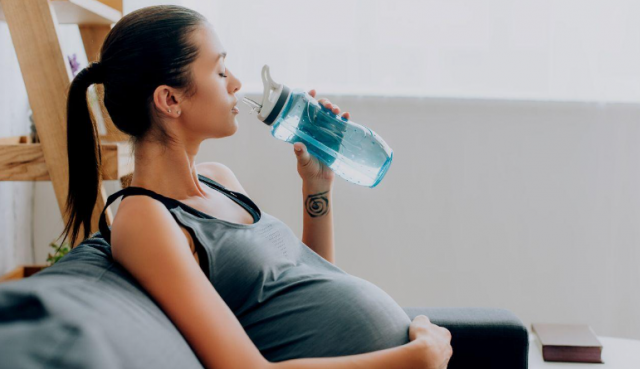Pregnancy is a transformative journey marked by various physiological changes, and maintaining proper hydration becomes crucial for both the mother's well-being and the development of the growing fetus. Dehydration in pregnant women can occur due to several factors, such as increased blood volume, hormonal changes, and the demands of the developing baby.
WHAT CAUSES DEHYDRATION IN PREGNANT WOMEN?
When a woman is not careful dehydration during pregnancy can happen. This stems from multiple factors, including:
Increased Blood Volume: Pregnancy triggers a significant increase in blood volume to support the growing fetus. This heightened demand for fluids can lead to dehydration if the mother fails to consume an adequate amount of water.
Hormonal Changes: Hormonal fluctuations, particularly an increase in progesterone levels, can lead to an increase in urine production. This can contribute to fluid loss and dehydration if not compensated by increased fluid intake.
Morning Sickness: Nausea and vomiting, commonly experienced during the first trimester of pregnancy, can lead to fluid loss and contribute to dehydration if not managed effectively.
Physical Activity: Pregnant women may sometimes underestimate the impact of physical activity on their hydration status. Exercise and external factors, such as high temperatures, can contribute to increased fluid needs.
HOW DOES A PREGNANT WOMAN STAY HYDRATED?
Hydration during pregnancy is important for the health of both the mother and the baby. Effective strategies to maintain hydration include:
Regular Water Intake: Drinking an ample amount of water throughout the day is fundamental for staying hydrated. Carrying a reusable water bottle can serve as a convenient reminder to sip water consistently.
Balanced Diet: Consuming water-rich foods, such as fruits and vegetables, contributes to overall hydration. These foods not only provide essential nutrients but also contribute to the body's fluid intake.
Electrolyte-Rich Drinks: Oral rehydration solution for pregnant, which contain a balanced mix of electrolytes like sodium and potassium, can help replenish lost fluids and minerals, especially during episodes of nausea or vomiting.
Avoiding Caffeine and Sugary Drinks: Caffeine and sugary beverages can contribute to dehydration. Limiting their intake and opting for water or electrolyte-rich drinks is advisable.
WHAT ARE ORAL REHYDRATION SOLUTIONS FOR PREGNANT WOMEN?
Oral rehydration solutions (ORS) for pregnant women are specially formulated drinks designed to replenish fluids and essential electrolytes. These solutions typically contain a precise balance of electrolytes, including sodium, potassium, and glucose, to address dehydration effectively. Some solutions may also include additional nutrients such as zinc. ORS is available in pre-packaged forms or can be prepared at home under medical guidance.
IMPORTANCE OF ORAL REHYDRATION SOLUTIONS DURING PREGNANCY
The significance of oral rehydration solutions for pregnant women lies in their ability to:
Restore Electrolyte Balance: Pregnancy-related vomiting or morning sickness can lead to electrolyte imbalances. ORS helps restore these essential minerals, ensuring the proper functioning of muscles and nerves.
Prevent Complications: Dehydration during pregnancy can result in complications such as preterm labor and urinary tract infections. ORS serves as a preventive measure, reducing the risk of these complications.
Alleviate Nausea and Vomiting: The inclusion of glucose in ORS can help alleviate nausea and vomiting, providing relief to pregnant women experiencing morning sickness.
Support Fetal Development: Adequate hydration is crucial for the development of the fetus. ORS ensures that the growing baby receives the necessary nutrients and fluids for optimal growth.
CONCLUSION
Proper hydration during pregnancy is of great importance. The interplay of physiological changes and increased demands on the maternal body makes staying hydrated a crucial element in ensuring a healthy pregnancy. Dehydration, if left unaddressed, poses risks not only to the mother's well-being but also to the optimal development of the growing fetus. As such, implementing effective strategies becomes not just a choice but a necessity for expectant mothers.
The incorporation of fundamental practices, including regular water intake and a balanced diet, forms the cornerstone of these strategies. Additionally, the targeted use of oral rehydration solutions designed specifically for pregnant women emerges as a valuable tool in mitigating the risks associated with dehydration. These solutions, with their precise blend of electrolytes and nutrients, not only address dehydration efficiently but also contribute to the overall maternal and fetal health equation. By embracing these holistic hydration approaches, expectant mothers empower themselves to navigate the transformative journey of pregnancy with a heightened focus on well-being. This proactive stance fosters a nourishing and thriving environment for both the mothers and their developing babies, laying the foundation for a healthy and successful pregnancy journey.






